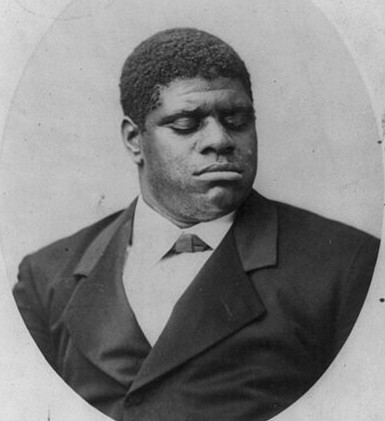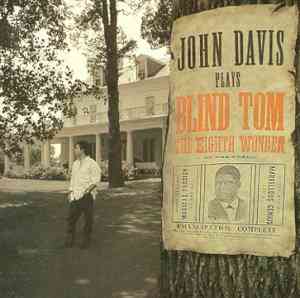 Thomas Greene Wiggins (1849-1908) was a former slave and indentured servant who began playing piano by the age of four and became one of the most celebrated musicians of the Civil War era.
Thomas Greene Wiggins (1849-1908) was a former slave and indentured servant who began playing piano by the age of four and became one of the most celebrated musicians of the Civil War era.Thomas was born autistic and without sight on May 25, 1849 to Mungo and Charity Wiggins, two Georgia plantation slaves owned by Wiley Edward Jones. His family was sold soon after to Colonel James Neil Bethune, and Tom was "thrown in as a bargain." By all accounts, because of his disabilities, Thomas was treated like a "household pet," but Bethune's daughter Mary recognized talent in the young boy and became his first music teacher. Thomas learned fast and began performing publicly by the age of eight.
By 1858, at the age of nine, Thomas was basically rented out by the Bethune family to Perry Oliver, who booked performances for Thomas all over the South, promoted as the "Musical Prodigy of the Age: a Plantation Negro Boy." Bethune received $15,000 for the three-year contract, which, as a slave, Thomas saw no part of.
Thomas Wiggins continued to astound audiences and performed many high-profile events, including a concert before President James Buchanan in 1859, becoming the first African-American to ever perform at the White House.
In 1864, James Bethune, sensing a Union victory in the Civil War (and an end to slavery), protected his investment by convincing Mingo and Charity to sign an indenture agreement for Tom's services. Under contract, Tom's parents were to receive "a good home and subsistence and $500 a year". Sixteen year old Thomas was promised "$20 per month and two percent of the net proceeds of his services".
Over the next few years, Thomas was touring all over the United States and Europe. He was being managed by John C. Bethune, who was earning as much as $50,000 a year from the performances. It was a rigorous schedule, but Thomas the respect of professional musicians the world over.
John G. Bethune had himself appointed Thomas's legal guardian on July 25, 1870, and soon moved to New York City to live with his new new wife, the owner of the boarding house where they lived (7 St. Marks Place).
Over the following nine years, while living here on St. Marks Place, Thomas Wiggins studied music with Professor Joseph Poznanski, who wrote down and collected many of Thomas' original compositions.
In 1865, a custody battle broke out when Charity Wiggins filed a suit against the Bethunes for the return of her son and a fair share of profits. John Bethune was killed in 1887 while trying to board a local train, but his widow, Eliza, ended up winning the long and bizarre custody battle later that year.
 Thomas' last public appearances were between April 17-22, 1905 in Boston and little was heard from him again until his death at age 59 on June 13, 1908. Thomas Wiggins died of natural causes in the new home of Eliza Bethune in Hoboken, NJ, his memorial was held at the Frank E. Campbell funeral chapel at 241 W.23rd Street.
Thomas' last public appearances were between April 17-22, 1905 in Boston and little was heard from him again until his death at age 59 on June 13, 1908. Thomas Wiggins died of natural causes in the new home of Eliza Bethune in Hoboken, NJ, his memorial was held at the Frank E. Campbell funeral chapel at 241 W.23rd Street.In 1999, the first commercial CD of music composed by Thomas Wiggins was released called John Davis Plays Blind Tom.
Read more about the incredible life of Thomas "Blind Tom" Wiggins here: http://chevalierdesaintgeorges.homestead.com/Wiggins.html
And Here: Blind Tom, the Black Pianist-Composer 1849-1908 By Geneva Handy Southall
blind tom is featured in some movie i saw recently. if i remember or see it again i'll post it here
ReplyDelete